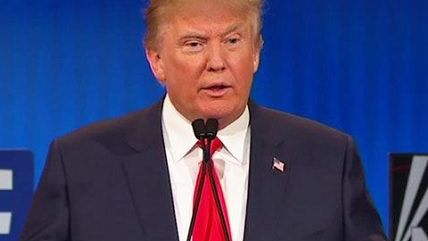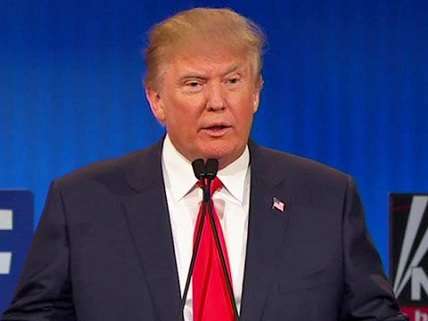Donald Trump Half Right on Iran—Rand Paul, Jeb Bush Voices of Reason
But Trump should know America loses when it lets its fears get the best of it.


A Republican primary debate is where half-baked ideas go to metastize into full-blown cancers. As I noted last night, while Donald Trump took credit for making illegal immigration an issue in the campaign, Republicans have been jockeying to be seen with the toughest stance on immigration for several election cycles. Mitt Romney's former deputy campaign manager argued earlier this summer that the constant "soft on immigration" attacks Republican candidates launched against each other in the 2012 cycle ultimately hurt the eventual nominee's chances in November. The American people, in general, aren't nearly as anti-immigration as the Republican base specifically.
It's the same process of awful with Iran. At yesterday's 5:00pm debate, the seven candidates vying to be on the main debate state next time around each tried to sound tough on Iran. "We need to be on the side that keeps Iran from getting a nuclear weapon," Rick Perry said by way of opposing the deal last night, promising tearing it up would be the first thing he did if he took office.
It's not an original line. Scott Walker promised the same on the campaign trail and repeated the promise at last night's main debate, saying he would "terminate the deal on day one," reinstate sanctions, and convince U.S. allies to do the same. The success of any plan to ditch the Iran deal and re-impose a sanctions regime hinges on that last piece, which is much easier said than done. While Republican Iran deal critics tend to point to President Obama's perceived weakness in negotiation to question the strength of the nuclear deal, negotiators from several other countries, France, the U.K., and Germany from the "ally" column, were involved in working out the deal too. Even if Obama and John Kerry were motivated primarily by the opportunity to build their legacies with an Iran deal, there's no reason other countries with their own political and national security concerns to go along with a deal just because the president of the United States would like one.
Walker has been called out for the dangerous rhetoric of ripping up the deal with Iran on day one by none other than Jeb Bush, who explained that things change on a day-to-day basis and promising to rip up a deal on January 20, 2017 when it's the summer of 2015 is irresponsible. Last night's moderators didn't go to Bush to see if he would respond similarly after Walker's comments at the debate. Instead, the question went to Rand Paul, one of a few Republicans who says he still supports negotiation with Iran even while promising to vote no and questioning whether the U.S. and its allies got the best deal possible. Paul said he'd never "discount negotiations" but that he "would have never released the sanctions before there was consistent evidence of compliance," a reasonable standard supporters of the deal would argue has been met.
Donald Trump, who said he would be the "polar opposite" of what we have now when it comes to dealing with Iran, may have made the most insightful comment about the Iran deal and its implications. "If Iran was a stock," Trump told the audience, "you folks should go out and buy it right now because you'll quadruple." Donald Trump is right. The deal with Iran, if it goes through and is implemented, will be great for the Iranian, and the global, economy. Several American companies are eager to compete in a market where European, Russian, and Chinese companies have been operating for years. The handicaps our government imposes on what kind of business American companies can do might be one of the reasons America, as Trump is fond of saying, "loses." But, unfortunately, that wasn't Trump's tack here. He said that "what's happening in Iran is a disgrace, and it's going to lead to destruction in large portions of the world." It's an unfortunate blind spot, ideological or politically calculated. After all, at the same debate, Trump boasted he was the only candidate on stage who saw back in 2003 that going to war with Iraq would end in disaster. He may not be interested in war with Iran as the other option, but many of the other Republicans on the stage, through their rhetoric and policy stances, are indicating that they are.
